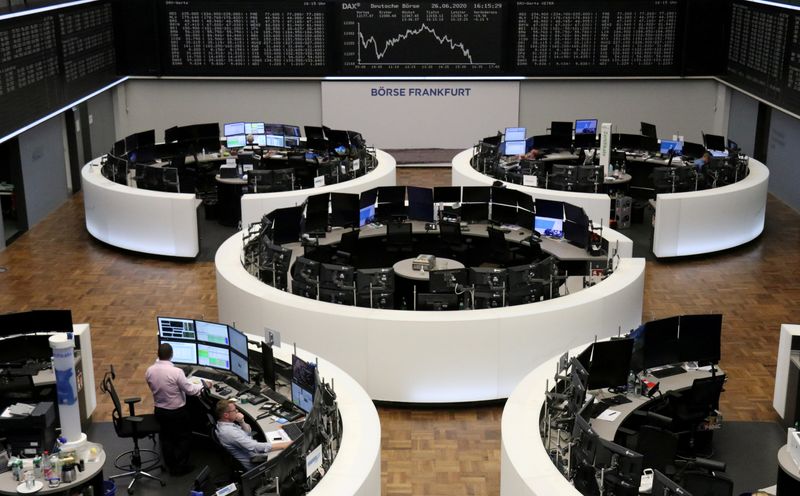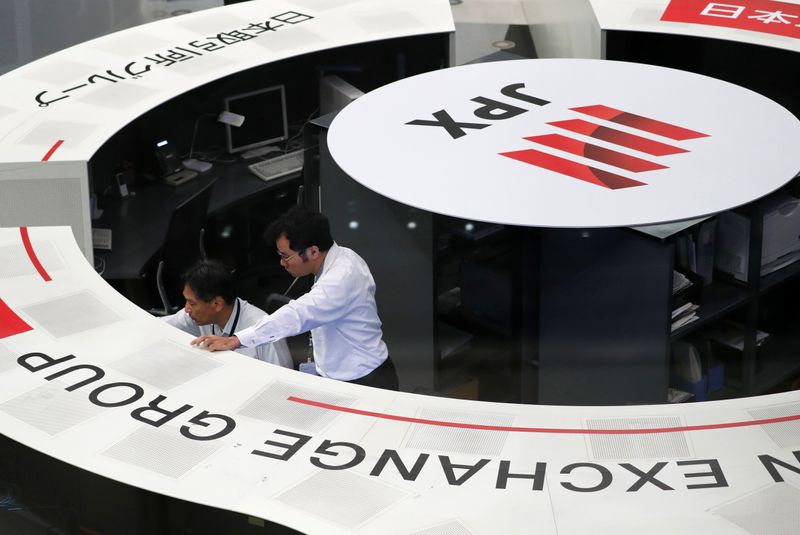By Tom Arnold and Swati Pandey
LONDON/SYDNEY (Reuters) - Global stocks faltered on Wednesday as an increase in new coronavirus cases in some parts of the world undermined prospects for a quick economic recovery.
Frankfurt, Paris and London all opened lower as investors shifted to wait-and-see mode before upcoming earnings and clung to the perceived safety of the U.S. dollar.
The pan-European STOXX 600 fell 0.4%.
London-listed HSBC shed 4% after Bloomberg reported that U.S. President Donald Trump's top advisers weighed proposals to undermine the Hong Kong currency's peg to the U.S. dollar. The proposal could possibly limit the ability of Hong Kong banks to buy dollars.
Finland's Nokia (HE:NOKIA) lost 7.5% on worries that the company was losing the business of its key client Verizon (NYSE:VZ) in the United States.
It was a rosier picture in Asia, where Chinese stocks extended their gains to seven sessions, with the blue-chip index up 1.6% to its highest close since June 2015. MSCI's broadest index of Asia-Pacific shares outside Japan was up 0.5%, still lower than a four-and-a-half-month high reached the day before.
E-mini futures for the S&P 500 were flat.
Overnight, U.S. stocks fell, halting a five-day winning streak by the benchmark S&P 500 index, its longest this year, driven by better-than-expected economic data.
"It is impossible for investors not to grow weary and eventually, at some point, fall prey to the endless drip of negative Covid-19 stories and how the second-wave virus will crush the market," said Stephen Innes, chief global market strategist at AxiCorp.
"Despite the lack of market participation, it certainly feels like we are gradually morphing from the view of a fragile recovery to one of full-bore scepticism."
Second-quarter earnings season begins in earnest next week.
"It will be important to watch the number of U.S. deaths in coming weeks and whether greater questions will be asked about the extent of necessary restrictions," said NAB economist Tapas Strickland.
California reported more than 10,000 coronavirus cases on Tuesday, a record rise for a single day. That exceeded the number of contact tracers recently trained by the state to detect and prevent potential outbreaks.
Coronavirus cases were also on the rise in the Australian state of Victoria, which led to lockdown measures being re-imposed in Melbourne, the country's second-biggest city.
MSCI's All-Country World Index, which tracks shares across 49 countries, was 0.2% down. (Graphic: World's biggest stock markets since start of 2020, https://fingfx.thomsonreuters.com/gfx/mkt/gjnvwwkrovw/Pasted%20image%201594112037896.png)
Citi analysts predicted global equities would hang around current levels in 12 months' time.
"We expect bullish and bearish forces to cancel each-other out," they said in a note. "We would not chase markets higher from current levels, but would prefer to wait for the next dip." Citi has "overweight" positions on U.S. and emerging-market equities.
Bond markets were focused on a meeting on Wednesday between European Union officials to discuss the shape of the EU's recovery fund.
Yields of German 10-year government debt edged 2 basis points lower to -0.477%, just above a one-week low of -0.495%.
Yields for Italian bonds, which have been the biggest beneficiary of the EU recovery fund proposals, were steady.
The dollar dipped slightly as investors weighed hopes for a quick economic recovery against anxiety about a resurgent pandemic, blurring the overall picture.
The euro strengthened a modest 0.12% to $1.2870 while a recent fall in selling positions against the greenback provided room for possible further drops.
Sterling traded at $1.2545, near three-week highs, before British finance minister Rishi Sunak announced his next moves to prevent a wave of job cuts from damaging an already weakened economy.
In commodities, gold breached $1,800 an ounce for the first time since 2011 as investors preferred safe-haven assets. Spot gold was 0.4% stronger at 1,802.4 per ounce.

Brent crude futures fell 0.1%, to $43.03 a barrel. U.S. West Texas Intermediate (WTI) crude futures slipped 0.3%, to $40.50 a barrel.
